

We don’t need no education? – informing the misinformed. Can we really trust Facebook, Google and WhatsApp to provide designs that put people’s interests at the centre?
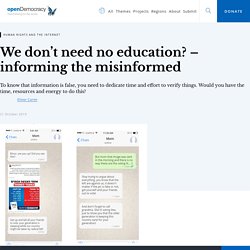
The fact that Donald Trump’s Twitter account is still active despite distributing disinformation and other sexist and racist tweets, suggests no. We don’t need no education? – informing the misinformed. Facebook’s Hands-Off Approach to Political Speech Gets Impeachment Test. But by removing itself as the moderator of political content — including in paid ads on the site — Facebook has left itself open another avenue of criticism.

In a series of tweets Monday evening, Senator Elizabeth Warren, one of the front-runners for the Democratic nomination, said Facebook allowed President Trump to spread false information widely, and called on the company to take down the attack ad against Mr. Biden, one of her top rivals. “Facebook already helped elect Donald Trump once because they were asleep at the wheel while Russia attacked our democracy — allowing fake, foreign accounts to run ad campaigns to influence our elections,” Ms. Helping teens root out misinformation and get media savvy.
Editor’s Note: Katy Byron is the Editor and Program Manager of MediaWise at The Poynter Institute for Media Studies.
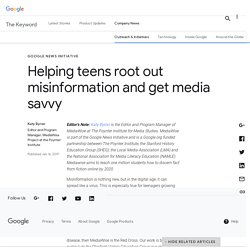
MediaWise is part of the Google News Initiative and is a Google.org funded partnership between The Poynter Institute, the Stanford History Education Group (SHEG), the Local Media Association (LMA) and the National Association for Media Literacy Education (NAMLE). Mediawise aims to teach one million students how to discern fact from fiction online by 2020. Misinformation is nothing new, but in the digital age, it can spread like a virus. This is especially true for teenagers growing up with mobile phones as an extension of how they engage with the world and their friends. How to Reverse Image Search on your Phone. Know more about any photograph with Google Reverse Image Search Google Reverse Image Search helps you quickly discover visually similar images from around the web.
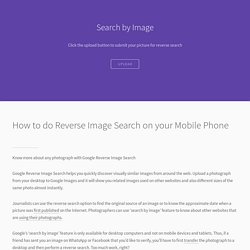
Upload a photograph from your desktop to Google Images and it will show you related images used on other websites and also different sizes of the same photo almost instantly. Journalists can use the reverse search option to find the original source of an image or to know the approximate date when a picture was first published on the Internet.
Photographers can use ‘search by image’ feature to know about other websites that are using their photographs. Trump’s latest lies: a linguist explains how the media should respond. President Donald Trump has hacked the media.
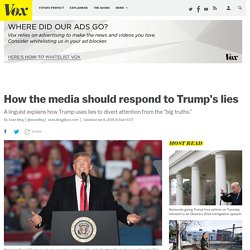
As Vox’s Ezra Klein argued recently, the press is in a lose-lose situation — and we all know it. Trump thrives on opposition, and often the media plays right into his hands, feverishly chasing every lie and half-truth he utters or tweets. George Lakoff, a professor of linguistics and cognitive science at UC Berkeley and the author of the 2004 book Don’t Think of an Elephant, recently published an article laying out the media’s dilemma. Trump’s “big lie” strategy, he argues, is to “exploit journalistic convention by providing rapid-fire news events for reporters to chase.” According to Lakoff, the president uses lies to divert attention from the “big truths,” or the things he doesn’t want the media to cover.
Oregon white nationalist clashes with antifa activists, later hospitalized. Corvallis police respond to large fight, take four people into custody. English Language Arts and Literacy, Social Studies. Understanding American politics in the Trump era: 9 of psychology’s best lessons. In January 2017, when then-White House press secretary Sean Spicer tried to claim that President Donald Trump’s inauguration was the most-watched in history, it felt like the beginning of a new, dark era of politics and public life.
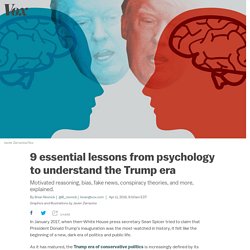
As it has matured, the Trump era of conservative politics is increasingly defined by its tribalism and fear and the fracturing of our sense of a shared reality. And it’s pretty disorienting. I’ve spent much of the past several years reporting on political psychology, asking the country’s foremost experts on human behavior some variation of, “What the hell is going on in the United States?” Thankfully, at a time when we really need answers, they often deliver. Here are the social science lessons I keep coming back to, to help me explain what’s happening in America in the Trump era. Untitled. For Two Months, I Got My News From Print Newspapers. Here’s What I Learned. False news spreads faster than truth online thanks to human nature – TechCrunch.
Elections 2018: How to stop Russian interference. There is little room for doubt that Russia interfered in the 2016 election.
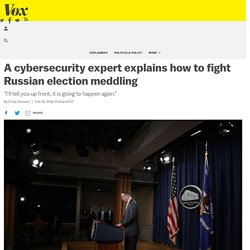
The Justice Department on Friday handed down indictments to 13 Russian people and 3 Russian companies for meddling in United States political and election processes, the latest item in a litany of evidence that Russia, well, did it. Even scarier, there is every indication Russia is likely to try to interfere in the American political process again — and many of the technologies, trends, and processes it exploited in the past are largely unchanged.
(Catch that New York Times story on the Twitter bot factories?) Fake news is not the real problem. Facinghistory. Living in a 24-hour news cycle presents unique challenges for all of us, especially young students.
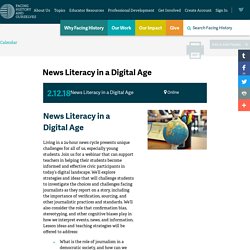
Join us for a webinar that can support teachers in helping their students become informed and effective civic participants in today’s digital landscape. We’ll explore strategies and ideas that will challenge students to investigate the choices and challenges facing journalists as they report on a story, including the importance of verification, sourcing, and other journalistic practices and standards. We’ll also consider the role that confirmation bias, stereotyping, and other cognitive biases play in how we interpret events, news, and information. Lesson ideas and teaching strategies will be offered to address: AP Stylebook on Polls and Surveys. AP Stylebook on polls and surveys Stories based on public opinion polls must include the basic information for an intelligent evaluation of the results.
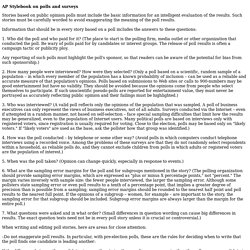
Such stories must be carefully worded to avoid exaggerating the meaning of the poll results. Information that should be in every story based on a poll includes the answers to these questions: 1. 5 Strategies for Spotting Fake News Stories (and Why You Need To) Fake news happens just as often as real news does.
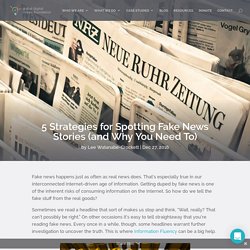
That’s especially true in our interconnected Internet-driven age of information. Getting duped by fake news is one of the inherent risks of consuming information on the Internet. So how do we tell the fake stuff from the real goods? Sometimes we read a headline that sort of makes us stop and think, “Wait, really? Why I Get All My News From a Man Trapped At the Bottom of a Well - McSweeney’s Internet Tendency.
If Americans can agree on one thing in these divisive times, it’s the unreliability of the mainstream media. Whether it’s alarmingly erroneous polling predictions or unapologetic partisan bias, we live in an age where no media outlet can be trusted — which is why for my political news, opinion, and analysis, I turn to a man trapped at the bottom of a well. I understand that you may have some questions, but allow me first to say that I admittedly don’t know much about my sole political correspondent, other than that he most certainly has been confined within the cavernous depths of a damp pit for as long as I can remember.
Combating Fake News And Teaching Digital Literacy. If the most recent U.S. Election has taught us anything it's that we live in an era of fake news and sites. With accusations flying of manipulation of stories, the media and voters, it’s truly hard to know if what we read on blogs, social media and other sites is actually the truth or a tale spun to generate clicks. To further compound the problem a recent study from Stanford shows that the vast majority of students can’t determine it what they read on websites is true or baloney. The study showed More than two out of three middle-schoolers couldn’t see any valid reason to mistrust a post written by a bank executive arguing that young adults need more financial-planning help. There’s a Psychological Reason for the Appeal of Fake News. A more plausible explanation is our relative inattention to the credibility of the news source.
I’ve been studying the psychology of online news consumption for over two decades, and one striking finding across several experiments is that online news readers don’t seem to really care about the importance of journalistic sourcing – what we in academia refer to as “professional gatekeeping.” This laissez-faire attitude, together with the difficulty of discerning online news sources, is at the root of why so many believe fake news. Do people even consider news editors credible? Since the earliest days of the internet, fake news has circulated online. Why Google might not be able to stop "fake news" Most Students Don’t Know When News Is Fake, Stanford Study Finds. Preteens and teens may appear dazzlingly fluent, flitting among social-media sites, uploading selfies and texting friends. But they’re often clueless about evaluating the accuracy and trustworthiness of what they find.
Some 82% of middle-schoolers couldn’t distinguish between an ad labeled “sponsored content” and a real news story on a website, according to a Stanford University study of 7,804 students from middle school through college. The study, set for release Tuesday, is the biggest so far on how teens evaluate information they find online. Snopes' Field Guide to Fake News Sites and Hoax Purveyors. The sharp increase in popularity of social media networks (primarily Facebook) has created a predatory secondary market among online publishers seeking to profitably exploit the large reach of those networks and their huge customer bases by spreading fake news and outlandish rumors. How to avoid getting conned by fake news sites - CNET. We Have a Bad News Problem, Not a Fake News Problem. Will Cutting Off Ads From Google & Facebook Really Stop Fake News? Let Them Eat Facts: Why Fact Checking Is Mostly Useless In Convincing Voters.
Last week I wrote a bit about the ridiculous and misguided backlash against Facebook over the election results. Web giants Google and Facebook seek to cut off revenues from fake news sites. Be the First to Test NLP’s checkology™ Virtual Classroom. Skip to main content. Bernie Sanders Could Replace President Trump With Little Known Loophole. Facebook may have built then ditched an update to fight fake news - CNET. 6 in 10 of you will share this link without reading it, a new, depressing study says. (iStock) On June 4, the satirical news site the Science Post published a block of “lorem ipsum” text under a frightening headline: “Study: 70% of Facebook users only read the headline of science stories before commenting.”
Sigm095 gabielkov. If you use Facebook to get your news, please — for the love of democracy — read this first. Use Facebook to get your news? Sign in - Google Accounts. Bob Simon: There are not always two sides to every story. Emergent.info Blog — The King vs. ISIS: Take this week’s Viral News... ?utm_content=bufferd691c&utm_medium=social&utm_source=twitter. JD Ferries-Rowe sur Twitter : "Heading to @wfyi on a rainy day to talk a little #newsliteracy & #digcit @brebeufjesuit... The News Literacy Project. JD Ferries-Rowe sur Twitter : "Definitely. MT @MsMaryOwen: Hey, ya'll should follow @jdferries...might be funnier on Twitter. #newsliteracy #LOL. ? JD Ferries-Rowe sur Twitter : "coding teaches beyond data: logical progression, thinking, engagement - ideas transfer to #newsliteracy. #NLsummit.
Breaking down barriers to reading news: 7 good questions with Newsela’s Jennifer Coogan. Web Literacy Education for Educators - November Learning.